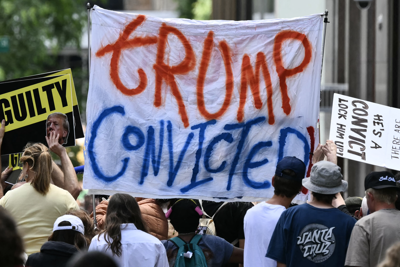
Este artículo estará disponible en español en El Tiempo Latino.
Donald Trump became the first U.S. president, current or former, to be convicted of a criminal offense when a 12-person jury in New York on May 30 found him guilty on 34 felony counts of business fraud as part of an illegal scheme to influence the 2016 election by making payments to suppress a sordid tale of sex with a porn star.
The unprecedented conviction raises questions about what’s next for the 77-year-old man who is in line to become the Republican Party’s nominee for president in 2024.
In remarks at Trump Tower a day after his conviction, Trump called the United States “a corrupt country” and declared that he would be “appealing this scam.”
(Trump also repeated many of the false, misleading and unsupported claims he has made about the judge, the judge’s rulings, the district attorney and other issues related to the trial. For more about Trump’s talking points, see our May 30 article, “Trump’s Repeated Claims on His New York Hush Money Trial.” He also repeated false and unsubstantiated claims on other issues, such as taxes and migrants.)
Here, we answer some of the questions raised by the former president’s conviction:
What are the next steps in the case?
What punishment could Trump face? Will he go to prison?
Can Trump vote in the 2024 election?
Can a felon run for president, hold office?
Can Trump pardon himself on this conviction, if he wins?
What are the next steps in the case?
Sentencing and an appeal are up next in this case.
Sentencing by Justice Juan Merchan is scheduled for July 11. Before that date, a probation officer or someone in that department will interview Trump, and potentially others involved in the case or connected to Trump, and prepare a pre-sentence report for the judge. The report includes the personal history and criminal record of the defendant, and it recommends what sentence the defendant should receive, according to the New York State Unified Court System.
“The pre-sentence interview is a chance for the defendant to try to make a good impression and explain why he or she deserves a lighter punishment,” the state court system explains.
Trump’s lawyers have to wait until after the sentencing to appeal the conviction. First, Trump’s lawyers will file motions before the judge “in a couple weeks” saying why they found the trial to be “unfair,” Trump’s defense attorney Todd Blanche told CNN hours after the guilty verdict.

Cheryl Bader, a clinical associate professor of law at Fordham University School of Law, said these motions are typical when a defendant is convicted. The defense attorneys will ask the judge to overturn the jury’s conviction. “It’s rarely, rarely granted, and I don’t think there’s a chance that will happen in this case,” she told us in a phone interview.
Blanche told CNN that if the motions aren’t successful, “then as soon as we can appeal, we will. And the process in New York is there’s a sentencing, and then — and then we appeal from there.”
Bader, a former assistant U.S. attorney for the District of New Jersey, walked us through the appeals process. “The case is considered completed at sentencing,” she said. “At that point, his lawyers file a notice of appeal … letting the court know that he intends to appeal.”
At that point, they will also request a “stay” on the sentence, meaning a pause on imposing the sentence while the case is being appealed.
This appeal goes to the Appellate Division, First Judicial Department in Manhattan. The appeals court doesn’t retry the case. “They’re not going to substitute their judgment on the facts for the jury’s judgment,” Bader explained. Instead, “they’re looking for where there was error that would have led to an improper prosecution or an unfair trial.”
The appeals process would take several months to a year, she said. After the notice of appeal is given, the record of the case is gathered, including trial transcripts, the indictment, pretrial motions, evidentiary rulings, jury selection and instructions, and more. Trump could also appeal the sentencing. The lawyers need to write their arguments for all of the issues they’re objecting to, and that takes time, Bader said.
And then the appeals court needs to consider the case and write a decision on it.
If Trump ultimately isn’t successful at the appellate level, he can appeal to the highest court in New York state, which is called the Court of Appeals. But the court decides whether or not it takes the case.
After such an appeal to the highest state court, the case would be over — unless Trump tries to appeal to the U.S. Supreme Court. But there has to be a U.S. constitutional issue for that. “I don’t see one,” Bader said, but perhaps Trump’s lawyers would try to make an argument.
What punishment could Trump face? Will he go to prison?
Whether Trump is sentenced to any time in prison is up to the judge.
Each of the 34 counts of falsifying business records in the first degree, a class E felony, carries a maximum sentence of up to four years in prison. The judge could decide to impose the sentences consecutively or simultaneously. However, under New York law, 20 years is the maximum prison time that Trump could get — not 187 years, as Trump falsely claimed in his May 31 remarks.
Norman Eisen, a CNN legal analyst and a senior fellow in governance studies for the Brookings Institution, said that “in the most serious” cases of business records falsification in New York that he studied, “a sentence of imprisonment was routinely imposed.” Trump’s case “is the most serious one in NY history,” he wrote on X, predicting that Manhattan District Attorney Alvin “Bragg will likely ask for incarceration & Merchan will consider it.”
While possible, Bader, with Fordham’s School of Law, told us she doesn’t think incarceration will happen.
For a first-time convicted felon, with a low-level, nonviolent felony and a person of advanced age, “under any circumstance like that, there’d be a relatively low chance of incarceration,” she said.
“On the other hand, I could see the prosecutor arguing that here’s a man who has shown disrespect for the court system and the rule of law and has violated the court’s orders on numerous occasions. He is not remorseful. And that in order to promote general deterrence, he needs to be punished,” she said in describing a possible argument from the prosecutor.
Bader said any incarceration sentence “would be only a token amount of time to make the point that Trump is not above the law.” Other sentencing possibilities include probation or a “conditional discharge” with conditions other than incarceration or probation.
The “simplest” option might be for the judge to fine Trump, she said.
Can Trump vote in the 2024 election?
Yes, Trump can vote as long as he is not in jail on Election Day, which this year is on Nov. 5.
Trump owns homes in New York and Florida, but in 2019 he changed his primary residence to Florida. However, Florida law does not apply in Trump’s case because he was convicted in New York. Instead, New York law applies.
“If you were convicted outside Florida, your voting rights are governed by the state where you were convicted,” as the American Civil Liberties Union of Florida explains on its website.
In 2021, New York state enacted a law that “restores the right to vote for a person convicted of a felony upon release from incarceration, regardless of if they are on parole or have a term of post-release supervision,” the New York State Board of Elections says. “If a convicted felon is not incarcerated, they are eligible to register to vote.”
Can a felon run for president, hold office?
Yes. According to Article II, Section 1, Clause 5 of the U.S. Constitution, there are three qualifications to serve as president: He or she must be at least 35 years old upon taking office, a U.S. resident for at least 14 years and a “natural born Citizen, or a Citizen of the United States.”
“These qualifications are understood to be exclusive,” Josh Chafetz, a Georgetown University law professor, told us last year when we were writing about Trump’s federal indictment related to allegations of mishandling sensitive classified documents after he left office. “Anyone can be president so long as they meet the constitutional qualifications and do not trigger any constitutional disqualifications.”
“Someone can run for president while under indictment or even having been convicted and serving prison time,” said Chafetz, who pointed to the example of Eugene V. Debs, the late labor leader, who, in 1920, ran for president from prison on the Socialist Party ticket and got almost 1 million votes.
There is an exception to that rule. The Constitution says in Section 3 of the 14th Amendment that no U.S. officeholder, including the president, can serve if they are convicted of “engag[ing] in insurrection or rebellion” against the U.S. — something Trump has not been charged with either in this case or the three others he faces.
Six Colorado voters successfully sued in state court to prevent Trump from appearing on that state’s ballot, citing the constitutional amendment barring insurrectionists from holding federal office. But the U.S. Supreme Court reversed the state ruling, “[b]ecause the Constitution makes Congress, rather than the States, responsible for enforcing Section 3 against federal officeholders and candidates.”
Can Trump pardon himself on this conviction, if he wins?
The short answer is no.
Trump was convicted in New York for offenses in violation of state law. Article II, Section 2 of the U.S. Constitution states that a president has the “[p]ower to grant reprieves and pardons for offences against the United States.” According to Constitution Annotated, a government-sanctioned record of the interpretations of the Constitution, that means the power extends to “federal crimes but not state or civil wrongs.”
In a case decided in 1925, Ex parte Grossman, the U.S. Supreme Court confirmed that interpretation, writing that the Constitution’s language specifying presidential pardon power for offenses “against the United States” was “presumably to make clear that the pardon of the President was to operate upon offenses against the United States as distinguished from offenses against the States.”
The New York governor has the power to pardon Trump for his conviction of crimes under state law. That’s currently Gov. Kathy Hochul, a Democrat. After the verdict, Republican Rep. Nick LaLota called on Hochul “to immediately announce her intention to pardon President Trump and pre-emptively commute any sentence. To not do so is to allow America to become a banana republic.” Hochul released a statement on May 30 saying, “Today’s verdict reaffirms that no one is above the law.”
Editor’s note: FactCheck.org does not accept advertising. We rely on grants and individual donations from people like you. Please consider a donation. Credit card donations may be made through our “Donate” page. If you prefer to give by check, send to: FactCheck.org, Annenberg Public Policy Center, 202 S. 36th St., Philadelphia, PA 19104.
The post Q&A on Trump’s Criminal Conviction appeared first on FactCheck.org.
